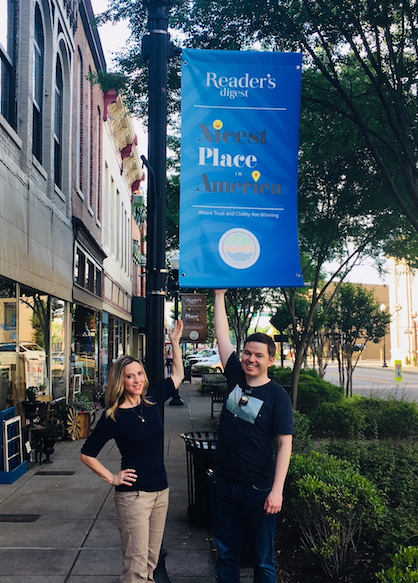Dmitriy Nizhebetskiy owns PMBasics101.com where he writes about Project Management.

Gallatin, TN is the nicest place in America! Who knew?
When he told me he was traveling from Kiev, Ukraine to Nashville, Tennessee, I headed over from Memphis.
I didn’t want to miss the chance to meet face-to-face and discuss the joys and challenges of IT project management.
We both came to IT Project Management from non-technical backgrounds. I wanted him to share his story as more evidence that you can have a successful IT project management career even if you don’t have a background as a software developer.
Leigh: How did you get into IT project management?
Dmitriy: Accidentally. I received a Master’s in Navigation and Ship Handling in Academy. (note: this is somewhat equivalent to University but with a military component) When I finished I was to be an officer on a sea vessel. However, the last year I learned of health issues that prevented me from going to sea.
I moved to Kiev and needed to find a job. My school friend said that I could get a job at the software company where she worked. They had an opening for an entry-level position. It wasn’t necessary to know about software development. I interviewed and got the job.
For about 9 months I was technical support writing emails to users. While working in the tech support department, I saw that the email they sent to the users had to go through a time-consuming vetting process that cost a lot of money. But I noticed many of the questions were the same. So, I did the obvious thing and wrote a standard answer for each of these common questions. It saved a lot of time. And this got me noticed. I did it on my own by taking initiative to increase efficiency.
In the time working in tech support, I saw the Project Managers and how they worked. I thought I could do this work.
I told my company I was going to leave to pursue a PM position. When I said I was leaving to look for a PM position they offered me the role there within the company.
Leigh: And how did your projects start? What was it like at first?
Dmitriy: I got a small project with four developers. I had a mentor in the company who wanted to teach me everything about project management. But then he was overwhelmed with his own projects and broke his toe and was out for months.
So, I had to learn a lot on my own through trials and errors.
We started doing more projects for the client I worked with. And so I did many projects successfully.
The turning point was when I realized that project management expertise in this company was not enough. They had a custom project management approach and they developed it for 17 years and never changed it much. I decided that it doesn’t scale so I started learning as a Project Manager.
I went to conferences, studied and got my PMP certification. This is when I really started seeing myself as a true project manager.
Leigh: Do you believe the PMP certification made a big difference for you?
Dmitriy: Yes. It did because after I got it a lot of opportunities came available and I was able to choose any company and project in Ukraine. There are fewer experienced PMs who can manage larger teams greater than 50 people.
Leigh: Do you believe the PMP certification makes a big difference for others?
Dmitriy: Yes, but only later. Any certification helps you systematize a PM approach.
Leigh: But you can start doing project management work without a PMP. You and I both started that way.
Dmitriy: You can start and be a good project manager without the PMP certification. But when the projects become more complex with more stakeholders and team members, you need a structured approach. You can’t manage it by only meetings and one-on-ones. There is a start and an end, and there should be a structure to get you to the end. That’s where a PMP certification helps.
Leigh: I also believe that it can help you in the job search.
Dmitriy: When you want to level-up to more serious complex projects, the certification helps to validate that you have the knowledge. With a certificate, recruiters are more confident in your experience.
Leigh: You work for a company that provides software development and consulting services. What does a project manager do in this type of environment?
Dmitriy: It depends on the company, and the clients, and the types of contracts and interactions you have.
Sometimes you just have a scope of work that you must do for a piece of software, but sometimes the customer says they need a cool application and asks for a solution. We have conversations with a design-first approach. We collect requirements and create designs before coding anything. We work with the customers on User Experience. There are many questions and feedback in the process. You should be a middleman for clients who don’t know about software development much, and developers who know a great deal about software but can’t explain it to the customer.
Most of the time you don’t understand the technical details. A great deal of technology is stacked up and you can’t grasp it all. You must take the information from the guys and build a team you can trust because you’ll have more follow up work to do together.
Every decision has a serious impact going forward, both business and technical.
Leigh: Elaborate on that idea a bit more.
Dmitriy: Even if clients have technical expertise, we suggest several approaches and they decide. We need to make suggestions that we can support going forward.
We quite often need to integrate with other software and that adds complexity.
There’s competition between software service providers. If there are failed projects, we can lose that business going forward. So, delivering on time with satisfied clients is important. We must put together something they like and will use for many years.
Everyone who goes into software development – be ready for when you have a strong team of developers. You’ll also have strong personalities and they may not cooperate with each other well. If you leave them alone they may not do anything, but if you work with them they can do great things in shorter time. They may be competitive. You need to balance the input from different team members so you don’t demotivate anyone.
So, relationship with the team has a direct impact on the soundness of technical decisions.
Also, I need to note that there are several layers of management roles in the team, like Scrum Master, and then high-level project management that will manage across several teams.
So entry-level positions could be Scrum Master.
Leigh: You mention Scrum Master. I was going to ask you about Agile. Do y’all use it?
Dmitriy: Yes. All my colleagues work under an Agile approach. Usually not Scrum or Kanban but a customized approach. There will always be a mix of scrum master and Project Management.
You could be a low-level project manager when you are a scrum master and be a project manager for external stakeholders. Or you could be a high-level project manager and managing Scrum teams.
Leigh: Are you familiar with Scaled Agile?
Dmitriy: Yes. It has its good points. A company should be agile at various levels though. We should have an agile mindset, agile executives, and not set deadlines. Which is difficult. If you hire agile teams some companies are making the wrong type of contracts with fixed times. So, it is rarely pure Scrum or Kanban.
Leigh: Even when doing agile there are elements of project management that never go away.
Dmitriy: You’ll have several stakeholders who compete with one another sometimes. They all want to feed in their requirements that go into that application and they pour in those requirements. You must find ways to resolve such conflicts. You must have a theoretical basis to structure these stakeholders, teams, and work they do.
Leigh: What do you particularly enjoy about it?
Dmitriy: Every project manager should like the interaction between people. But I am an introvert. One-on-one is okay but in groups I get tired. So, organizing teams who can continue working without me is good. Building a team that knows everything about project management and workflows and communication so that I only need to solve external problems if they can’t make a decision is best. When I can see that I came to the office but I’m not managing the team – that’s when my best feelings come about project management.
I get satisfaction knowing that I’ve created a self-sufficient team who can move forward independently.
[click_to_tweet tweet=”I get satisfaction knowing that I’ve created a self-sufficient team who can move forward independently. – Dmitriy Nizhebetskiy” quote=”I get satisfaction knowing that I’ve created a self-sufficient team who can move forward independently. – Dmitriy Nizhebetskiy”]
Leigh: There are many introverted project managers.
Dmitriy: Yes. I used to think they were all extroverts, but I can now see that there are many introverts, too. They don’t engage as much on social networks because they spend so much of the week interacting at work.
Leigh: What interesting challenges have you encountered?
Dmitriy: For a while, I studied Objective C and started learning more about the technical side. The negative effect of that was that the developers started to answer my questions very carefully and became more cautious with me. So, when I saw that I decided it doesn’t bring benefits and stepped back from technical decisions. The more I moved away from it, the better the results. The developers started giving more solutions and felt more ownership for the solutions.
Now if I’m sure this person is confident in his abilities I let them own it.
People often ask if you need technical skills to be a software project manager. You don’t need the technical skills to be a project manager, but at some point, it helps to have an understanding. It makes it easier to build a relationship with the team. You’ll have an understanding of what it takes to do the things that need to be done.
There’s also a problem if the project manager gives too much technical perspective.
The engineer thinks on this for 8 hours a day. The project manager only scratches the surface. Even if you were previously technical, and you moved into management, you move away from it and get behind in technical expertise. For this reason, you will need to rely on your team members for their expertise.
Dmitriy Nizhebetskiy writes about project management at PMBasics101.com

Excellent interview Leigh. What PM coaching services do you provide? Do you provide PMP exam coaching. Thanks.
The Real Person!
Author Leigh Espy acts as a real person and passed all tests against spambots. Anti-Spam by CleanTalk.
Thanks for the kind words. I do provide PM coaching. I’ve worked with those who want to get a job in project management, and also new project managers to help them improve their skills.
I’d be happy to discuss with you if you’d like more information.
Leigh